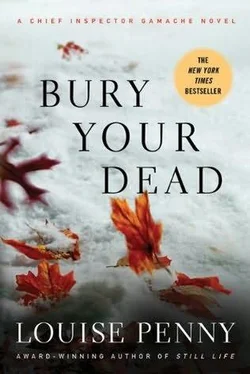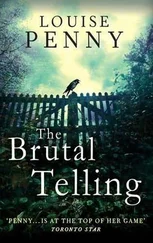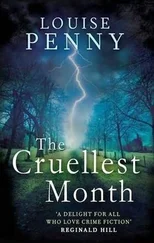Louise Penny - Bury Your Dead
Здесь есть возможность читать онлайн «Louise Penny - Bury Your Dead» весь текст электронной книги совершенно бесплатно (целиком полную версию без сокращений). В некоторых случаях можно слушать аудио, скачать через торрент в формате fb2 и присутствует краткое содержание. Жанр: Старинная литература. Описание произведения, (предисловие) а так же отзывы посетителей доступны на портале библиотеки ЛибКат.
- Название:Bury Your Dead
- Автор:
- Жанр:
- Год:неизвестен
- ISBN:нет данных
- Рейтинг книги:4 / 5. Голосов: 1
-
Избранное:Добавить в избранное
- Отзывы:
-
Ваша оценка:
- 80
- 1
- 2
- 3
- 4
- 5
Bury Your Dead: краткое содержание, описание и аннотация
Предлагаем к чтению аннотацию, описание, краткое содержание или предисловие (зависит от того, что написал сам автор книги «Bury Your Dead»). Если вы не нашли необходимую информацию о книге — напишите в комментариях, мы постараемся отыскать её.
Bury Your Dead — читать онлайн бесплатно полную книгу (весь текст) целиком
Ниже представлен текст книги, разбитый по страницам. Система сохранения места последней прочитанной страницы, позволяет с удобством читать онлайн бесплатно книгу «Bury Your Dead», без необходимости каждый раз заново искать на чём Вы остановились. Поставьте закладку, и сможете в любой момент перейти на страницу, на которой закончили чтение.
Интервал:
Закладка:
“No, though he used to love to sing. My father taught me poetry. We’d go for long walks through Outremont and onto Mont Royal, and he’d recite poetry. I’d repeat it. Not well, most of the words meant nothing to me, but I remembered it all, every word. Only later did I realize what it meant.”
“And what did it mean?”
“It meant the world,” said Gamache. “My father died when I was nine.”
Morin paused. “I’m sorry. I can’t imagine losing my father, even now. It must have been terrible.”
“It was.”
“And your mother? It must have been awful for her.”
“She died too. It was a car accident.”
“I’m sorry,” said the voice, small now, in pain for the large man sitting comfortably in his office while the young agent was all alone, tied to a hard chair, strapped to a bomb, facing a wall with a clock.
Counting down. Six hours and twenty-three minutes left.
And on Gamache’s computer the rapid instant messages from his team, covertly following leads.
It was clear now the young agent wasn’t being held at the La Grande dam. Agent Nichol and Inspector Beauvoir couldn’t pick up the sounds of the massive turbines. But they could pick up other sounds. Trains. Some freight according to Nichol. Some passenger. Planes overhead.
Agent Nichol stripped back layer after layer of sound. Isolating bits and pieces.
We can’t trace the call because it’s embedded, her message had said.
What does that mean? Gamache had written.
It’s like a hobo, riding along on a telecommunication line. Popping up here and there. That’s why he seems to be everywhere at once.
Can you find which line?
Not enough time, Nichol replied.
Six hours left. Then two things would happen, simultaneously. A bomb would destroy the biggest dam in North America. And Agent Paul Morin would be executed.
As the moments ticked down Chief Inspector Armand Gamache knew a terrible decision was racing toward them. A choice.
“Is Mundin’s son happy?” Elizabeth asked.
It took Gamache a moment, a heart beat, to come back. “I think so. Has a son of his own. Charlie.”
“Charlie,” she smiled. “I always think it’s nice when a child is named for a parent.”
Elizabeth got up, clearing the breakfast things. Gamache carried the tray to the old kitchen.
“There’s someone else I wanted to ask you about,” said Gamache, drying the dishes. “Do you know Carole Gilbert?”
“As in Vincent Gilbert?”
“Oui,” though he couldn’t believe Madame Gilbert would like to be defined by her estranged and exacting husband.
“I knew her slightly, we belonged to the same bridge club. But I think she’s moved away. Quebec City is quite small, Chief Inspector. And old Québec even smaller, within the walls.”
“And social circles smaller still?” smiled the Chief.
“Exactly. Some defined by language, some by economics and social standing, some by common interests. And often they overlap, and most people belong to more than one circle of friends and acquaintances. Carole Gilbert was an acquaintance, of the bridge variety.”
She smiled at him warmly as they walked to the front hall. “But why do you ask?”
They put on their heavy winter coats, boots, hats and scarves, so that by the time they were finished there wasn’t all that much to distinguish the Chief Inspector of homicide for Québec from the seventy-five-year-old woman.
“There was a case a few months back, in a village called Three Pines. Carole Gilbert lives there now. So does Old Mundin.”
“Really?” But she didn’t seem all that interested. Polite, but hardly riveted. Heading out into the sunshine they walked side-by-side down the middle of the narrow streets. Ahead they could see the young mountaineers strapped and harnessed thirty feet above the ground. They labored all winter shoveling snow from the steep metal roofs. It was harrowing to watch as they swung their axes and picks, hacking away at the feet of ice and snow that had accumulated, threatening to collapse the roofs.
Every winter roofs did collapse and every winter snow and ice slid off to the sidewalk below, crushing unfortunate pedestrians. There was a sound sliding ice made, a sound like no other, a cross between a slow, deep moan and a shriek. Every Québécois knew it, like buzz bombs in the Blitz.
But hearing it, and being able to do anything were two different things. The sound echoed off the old stone buildings, disguising location. It might be right above you, or it might be streets away.
True Québécois walked in the middle of the road. Tourists often thought the Québécois gracious, to cede the sidewalk to them, until the sound began.
“Would they have known each other here in Quebec City?” he asked.
“It’s possible. She might have bought some antiques from Monsieur Mundin, or sold some I suppose. She had marvelous things, as I remember. An old Québec family, you know.”
“The Gilberts?”
“No, Madame Gilbert’s family. The Woloshyns.”
They were approaching the Literary and Historical Society.
“I always liked Carole. Very sensible,” said Elizabeth as she brought out the key, warm from being carried in her glove. “It was a pleasure to play bridge with her. She’d never do anything foolish. Very patient, very calm, great strategist.”
Once inside Gamache helped Elizabeth turn on the lights and turn up the heat, then she went to her office leaving the Chief Inspector alone in the magnificent library. He stood for a moment, like a miser at the bank. Then walking over to the circular iron staircase he hauled himself up. At the top he paused again. It was quiet, as only an old library can be and he was left alone with his thoughts.
“La Grande? Are you fucking kidding me?” Chief Superintendent Francoeur demanded.
Inspector Beauvoir had joined the Chief Inspector in his office, bringing with him the evidence he and Agent Nichol had collected. It was sparse, but enough. They thought. They hoped. Beauvoir had again taken the stairs two at a time, preferring to arrive unannounced, by the back way. From the stairwell door he’d once again seen the Chief Superintendent leading the search operations. Monitoring. Issuing orders. Giving every impression of doing his best.
And he probably was doing his best. But his best was not, Beauvoir knew, good enough.
He could hear over the speakers Chief Inspector Gamache talking about his days at Cambridge University. How he’d arrived with almost no English. Only the phrases he’d picked up off the English television programs beamed into Québec in the 1960s.
“Like what?” Paul Morin asked. His voice dragged, each word forced out.
“Fire on the Klingons,” said the Chief Inspector.
Agent Morin laughed, perking up. “Did you actually say that to anyone?”
“Sadly, I did. It was either that or, ‘My God, Admiral, it’s horrible.’ ”
Now Agent Morin whooped with laughter and Beauvoir saw smiles on the faces of the men and women in the Incident Room, including Chief Superintendent Francoeur. Smiling himself Beauvoir turned his attention to the Chief Inspector.
Through the glass he saw the Chief. His eyes closed, gray stubble on his face. And then Gamache did something Beauvoir had never seen him do before. In all the years, all the cases, all the death and despair and exhaustion of past cases.
Chief Inspector Gamache lowered his head into his hands.
Just for a moment, but it was a moment Inspector Beauvoir would never forget. As young Paul Morin laughed, Chief Inspector Gamache covered his face.
Then he looked up, and met Inspector Beauvoir’s eyes. And the mask reappeared. Confident. Energetic. In command.
Читать дальшеИнтервал:
Закладка:
Похожие книги на «Bury Your Dead»
Представляем Вашему вниманию похожие книги на «Bury Your Dead» списком для выбора. Мы отобрали схожую по названию и смыслу литературу в надежде предоставить читателям больше вариантов отыскать новые, интересные, ещё непрочитанные произведения.
Обсуждение, отзывы о книге «Bury Your Dead» и просто собственные мнения читателей. Оставьте ваши комментарии, напишите, что Вы думаете о произведении, его смысле или главных героях. Укажите что конкретно понравилось, а что нет, и почему Вы так считаете.











